Ho Chi Minh City is one of the localities with many advantages in piloting the implementation of English as a second language in schools. The city's implementation will also help other localities gain more experience in implementation.

Ho Chi Minh City builds competitive remuneration policies to attract and retain good teachers and native teachers.
PHOTO: DAO NGOC THACH
Regarding the orientation of making English the second language in schools in Ho Chi Minh City, Mr. Nguyen Bao Quoc, Deputy Director of the Department of Education and Training, said that the Department has proactively developed a draft project, organized to collect opinions from specialized departments and a number of educational institutions. The draft project has set out goals, key solution groups, specific implementation roadmaps for each stage, each level of education, along with a number of criteria, assessment standards... so that schools can be recognized as meeting the requirements of making English the second language in schools.
STRATEGIC SOLUTIONS FOR EACH STAGE
Regarding the preparation steps to build a roadmap to make English the second language in schools, the leaders of the Department of Education and Training of Ho Chi Minh City said that the city has many advantages in piloting the implementation of English as the second language in schools. These advantages are thanks to the effectiveness of programs and projects that have been implemented early, such as the English Enhancement Program from the 1998 - 1999 school year, the Integrated English Program (Project 5695 - Teaching and learning math, science and English integrating the English and Vietnamese programs) from the 2014 - 2015 school year...
Mr. Nguyen Bao Quoc said that to achieve the goal of making English the second language in schools, the project needs a specific roadmap with a clear analysis of standard changes, potential difficulties and challenges, and strategic solutions for each stage.
Specifically, phase 1 from now until 2030 is the pilot phase and expansion according to the roadmap. Focus on standardizing the teaching staff, training modern teaching methods (CLIL, PBL, CLT); developing a learning materials bank and sample documents integrating English into subjects. At the same time, invest in facilities, teaching equipment and technology infrastructure; deploy standard programs and learning materials; strengthen communication and mobilize consensus from parents and the community in the pilot phase.
Phase 2 to 2035 aims to expand and perfect the system. Accordingly, complete and standardize the program and learning materials in a flexible manner, suitable to the actual conditions of each locality and educational institution; develop online courses and digital resources to support teaching and learning. Develop competitive remuneration policies to attract and retain good teachers and native teachers; establish a system of periodic assessment and training; enhance socialization and international cooperation in training, accreditation and staff development.
Vision to 2045: Sustainable development and shaping of bilingual culture. Establishing foreign language education research centers, international cooperation in training and innovation of methods. Developing a team of highly qualified experts and teachers; promoting the application of AI, VR/AR in teaching and learning English; at the same time forming a bilingual culture in the community - where English is widely used in the life, culture and economy of the city; contributing to building Ho Chi Minh City into an educational, economic and financial center of Asia.
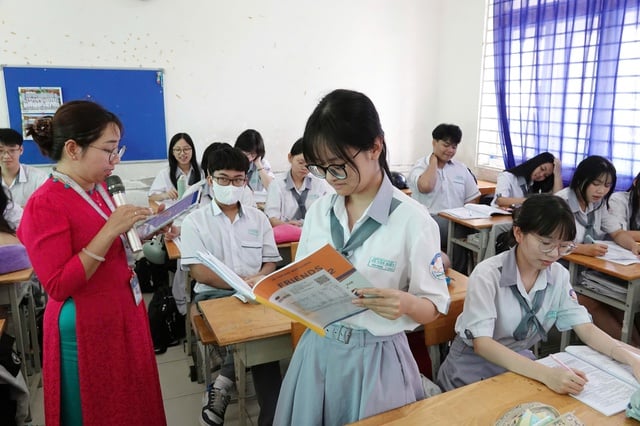
Ho Chi Minh City will effectively exploit existing human resources, develop a team of English teachers and teachers of subjects taught in English, ensuring sufficient quantity and consistent quality.
Photo: Dao Ngoc Thach
PROMOTING AI APPLICATIONS
In the draft Project to gradually make English the second language in schools in the period 2025 - 2030, with a vision to 2045, the Department of Education and Training of Ho Chi Minh City has identified key groups of tasks and solutions to be implemented according to the roadmap.
First of all, raise social awareness of the role of English in education and international integration, create unity and high consensus throughout the system. Build and perfect policy mechanisms and professional guidelines to gradually make English the second language in schools; including regulations on programs, textbooks, learning materials, testing - assessment, school activities and teacher development.
At the same time, Ho Chi Minh City will effectively exploit existing human resources, develop a team of English teachers and teachers teaching subjects in English, ensuring sufficient quantity and consistent quality. Develop and implement appropriate programs, learning materials and assessment criteria, ensuring connectivity between levels of education and the ability to integrate internationally. Along with that, innovate teaching methods, testing - assessment and build a bilingual learning environment in schools.
The city will promote the application of artificial intelligence (AI) in teaching and learning, develop digital learning platforms and invest in information technology infrastructure, equipment and facilities for bilingual education. In addition, the Department of Education and Training will also strengthen international cooperation and socialize education, attract resources from businesses and organizations at home and abroad; build a reward mechanism and recognize educational institutions that meet the criteria for effectively implementing the "English as a second language" model.
Also according to the Deputy Director of the Department of Education and Training, in order to improve English proficiency for children, high school students, and university students; contribute to the development of Vietnamese people in the age of science and technology, the digital age, and enhance international integration, the Department is reviewing and completing the city's draft project to specify the goals in accordance with the characteristics of Ho Chi Minh City, while ensuring that it meets the goals, requirements, and general orientations of the national project.
Hanoi trains more than 600 primary school teachers
With the determination to take the lead in implementing the policy of making English the second language in schools, the leader of the Hanoi Department of Education and Training said: At the end of October, more than 600 teachers of Hanoi primary schools were trained in methods, focusing on building an environment for students to communicate in English regularly. This is the foundation for making English the second language to be implemented systematically and scientifically right from the primary level.
In order to narrow the gap between the inner city and the suburbs, Hanoi is also promoting the implementation of the "twinning school pair" model, so that inner-city schools can provide professional support to schools in remote areas. It is expected that from January 2026, demonstration lessons and online foreign language self-study programs will be piloted throughout the city.
Tue Nguyen
Source: https://thanhnien.vn/tieng-anh-thanh-ngon-ngu-thu-hai-xay-dung-moi-truong-hoc-tap-song-ngu-185251102194035316.htm


![[Photo] Panorama of the Patriotic Emulation Congress of Nhan Dan Newspaper for the period 2025-2030](https://vphoto.vietnam.vn/thumb/1200x675/vietnam/resource/IMAGE/2025/11/04/1762252775462_ndo_br_dhthiduayeuncbaond-6125-jpg.webp)

![[Photo] The road connecting Dong Nai with Ho Chi Minh City is still unfinished after 5 years of construction.](https://vphoto.vietnam.vn/thumb/1200x675/vietnam/resource/IMAGE/2025/11/04/1762241675985_ndo_br_dji-20251104104418-0635-d-resize-1295-jpg.webp)
![[Photo] Ho Chi Minh City Youth Take Action for a Cleaner Environment](https://vphoto.vietnam.vn/thumb/1200x675/vietnam/resource/IMAGE/2025/11/04/1762233574890_550816358-1108586934787014-6430522970717297480-n-1-jpg.webp)
![[Photo] Ca Mau "struggling" to cope with the highest tide of the year, forecast to exceed alert level 3](https://vphoto.vietnam.vn/thumb/1200x675/vietnam/resource/IMAGE/2025/11/04/1762235371445_ndo_br_trieu-cuong-2-6486-jpg.webp)


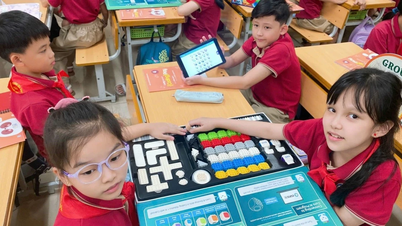

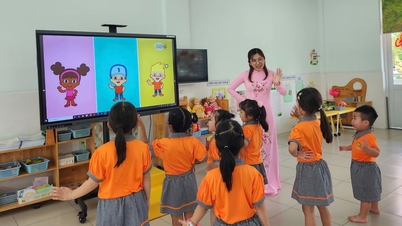
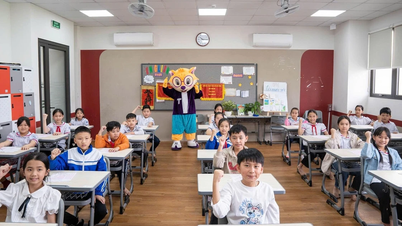

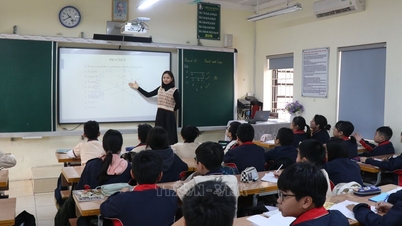

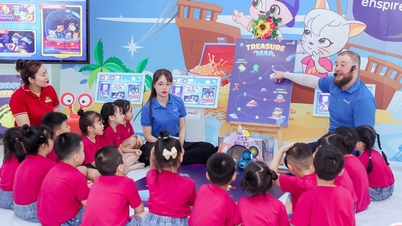



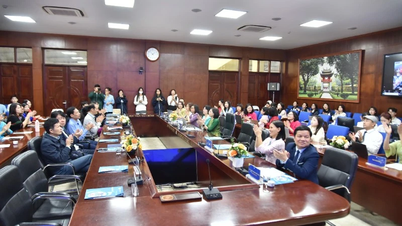

![[Video] Ministry of Education and Training announces the 2026 university and college enrollment plan](https://vphoto.vietnam.vn/thumb/402x226/vietnam/resource/IMAGE/2025/11/04/1762270484541_dung00-18-42-03still007-jpg.webp)
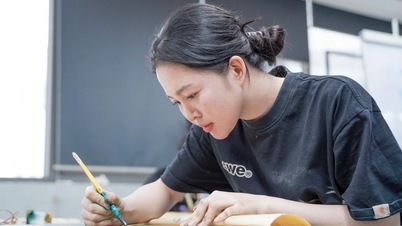






























































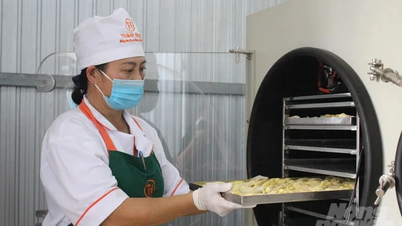

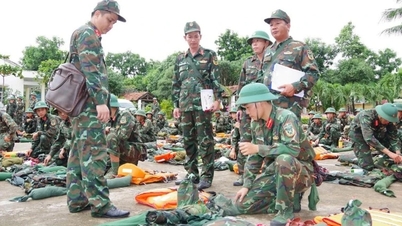














Comment (0)